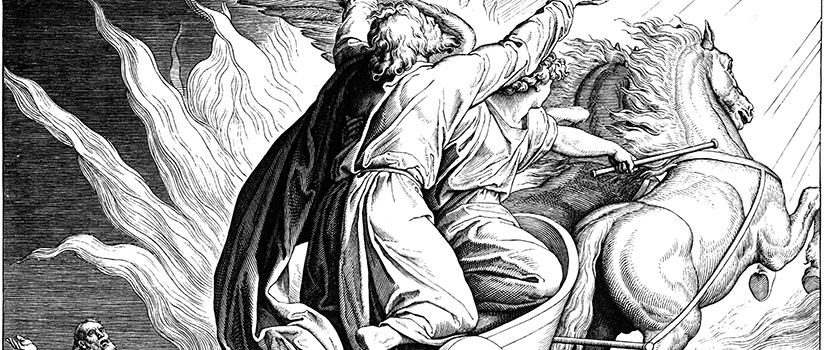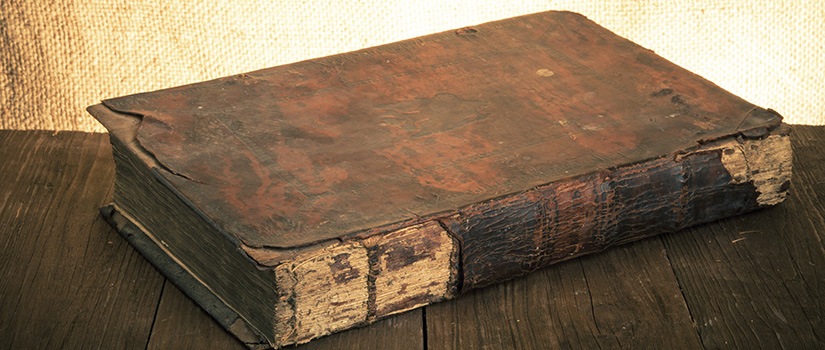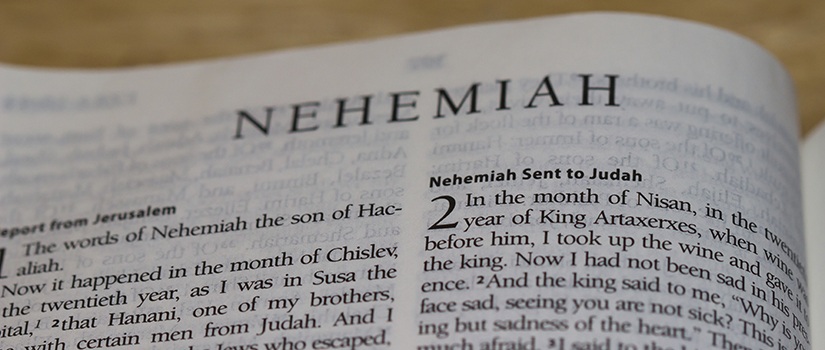Elijah’s Translation #3
This is the last section of this study of the translation of Elijah’s translation.
I hope you have read, or will read, the two other sections.
The following is some of the things in this section.
Final Words:
2 Kings 2:11a. “And it came to pass, as they still went on, and talked,”
And when they had passed over Jordan, and still walked on, what a talk that was. How we wish that we had a copy of that final conversation. We can only guess at what was said in those last few moments. Those who have ever sat by the bedside of a dying friend know what such moments are. The time seems all too short. So much is to be said, so many questions to ask, so many counsels to be given. So many wonderings as to what it will all be like when next we meet.
Chariot Of Fire, Horses Of Fire:
The sharp, decisive moment arrives at last:
2 Kings 2:11. “And it came to pass, as they still went on, and talked, that, behold, there appeared a chariot of fire, and horses of fire, and parted them both asunder; and Elijah went up by a whirlwind into heaven.”
Strange forms fill the sky. They draw near to the earth. There is a chariot of flames and horses of fire. They touch the earth. Elijah enters, and suddenly, in a whirlwind, is lost to mortal sight. But Elijah not only passed out of mortal sight, it is recorded that he went up into heaven. He was carried on through the pearly gates, on through, to the strains of heavenly music, on into the presence of the King, before whom he had stood while on earth. (1Kings 17:1) There is no word of an intermediate state.
The fact, of course, has been largely questioned by those who would eliminate all the supernatural from Scripture. Some say Elijah must have been struck by lightening, or lost in a mist, or carried away by a water-spout, or drowned in the Jordan, or buried in the desert, or taken captive in a chariot by Jeroram’s guards.
Nothing can be plainer than the sacred narrative itself; therefore, without exerting our ingenuity to twist or explain it away, we believe that a bright flame-cloud from heaven ‘parted’ the prophets from each other, and that, swept up in the storm that followed, Elijah was taken away.Traditional Jewish History says in July B.C. 896.
“Let me die the death of the righteous, and let my last end be like his.” Let me live as Elijah lived, and I shall — even though I pass through the valley of the shadow of death — enter as Elijah entered into that house of many mansions, that home eternal in the heavens, that “city that hath foundations, whose Builder and Maker is God.”
“The wilderness is left, the Jordan shrinks;
Southward o’er Sinai sweeps the meteor strange;
The moon appears above the waste, is neared,
While low beneath it shines a mottled earth,
Stars flit and fall, as he pursues his path,
Rushing to meet him, see vast streams of suns,
Then a wide ocean of essential light,
Then a great darkness, horrid and forlorn;
Till now, like mountains in the morning beam,
Appears the gateway of God’s city. High—
. . . . . . . . . . . When lo!
From the deep shrine of Unspeakable:
“Welcome, thou faithful servant of thy God!”’
(Abridged from a long passage in NIGHT, By Rev, George Gilfillan)
How characteristic was the close of the prophet’s career! It was fiery grandeur to the last. He who had twice called down fire from heaven, once on Carmel, and again on the solders who were sent to arrest him (2 Kings 1:9-14), and stood amid its terrors on Horeb (1 Kings 19:12)—ascends in flames, nor needs now to put off a body, which the burning soul within has already spiritualized.
The body of Elijah must have undergone a refining in its passage through the upper air, and regions of suns and star systems. What that refining was, we do not know; but in the opinion of many, had man not sinned, he would have passed as painlessly as Elijah, and Enoch did, from one stage of existence to another.
And Elisha Saw It:
2 Kings 2:12a. “And Elisha saw it,”
The historian doubtless reports the account which Elisha gave of what he saw on this memorable occasion. The condition was fulfilled which Elijah had laid down, and Elisha knew that his request for a “double portion” of his master’s spirit was granted.
2 Kings 2:12b. “and he cried,” My father, my father, the chariot of Israel, and the horsemen thereof.”
Elisha’s Lament: As Elijah was parted from him, and taken up, Elisha broke out into loud lament: “My father, my father! the chariot of Israel, and the horsemen thereof.” This no more implies that Elisha did not believe that his master was being taken up to heaven, than the mourning of Christians for the loss of some revered teacher or guide implies doubt as to his eternal happiness. It is the sense of personal loss, and of loss to the world, which prevails on these occasions.
Elisha did not overestimate the value of Elijah to Israel — more than chariots and horsemen — and we cannot overestimate the worth to a nation of the presence and labors of the servants of God in it. The religion of a nation is its best bulwark, and those who do most for religion are those who serve their country best. Armaments without God in the midst are of poor avail.
But Elisha probably meant something more than to show respect. He regarded himself as Elijah’s specially adopted son, and hence had claimed the “double portion” of the firstborn. That his request was granted showed that the relationship was acknowledged.
2 Kings 2:12c. “And he saw him no more:” Elijah passed beyond Elisha’s range of vision. So far as we can gather from the expressions employed, no cloud received him, as it did Jesus(Acts 1:9), but he gradually vanished from sight.
2 Kings2:12d. “and he took hold of his own clothes, and rent them in two pieces.” This was an action marking extreme horror or extreme grief here the latter.
“Then shall two be in the field, the one shall be taken, and the other left.”(Matthew 24:40) Aaron is taken and Moses is left; Moses is taken and Joshua is left; Elijah is taken and Elisha is left. It is a world of meeting and parting, of coming and going, of dropping away and being succeeded, as the leaves fall and come anew on the tree.
But it is something to be missed. “They mourned for Aaron thirty days:” (Numbers 20:29) a similar period “they wept for Moses in the plains of Moab:” (Deuteronomy 34:8)) and it came to pass when Elisha saw Elijah’s rapture, “he rent his garments in two pieces.” (2 Kings 2;12d)
There is a great Divine principal exemplified and operating here
Isaiah 6:12. And the LORD have removed men far away, and there be a great forsaking in the midst of the land.
13. But yet in it shall be a tenth, and it shall return, and shall be eaten: as a teil tree, and as an oak, whose substance is in them, when they cast their leaves: so the holy seed shall be the substance thereof.
Dark and desolate was Isaiah’s vision, yet it is the precisely the same still, whether politicians and diplomats believe it or not. Just as Elijah was Israel’s temporal savior, as righteous Lot preserved Sodom from destruction for years, as Paul was assured in the storm he was to be the means of delivering his fellow-voyagers from shipwreck, so, the Godly are the true conservators of civil society.
It is not her mines of coal and iron, her forests and fields, her factories and schools that have made our country great; and it is neither the exhaustion of the one nor the other that will bring about her decline and fall. Point rather to the Bible, the prayers of her Saints, the religion of our churches, the piety of our homes—these are our ‘chariots and horsemen,’ which in the hand of Providence, will do more for us than a thousand arsenals, to keep evil from our shores, better than fleets of ships and carriers, and planes, or thousands of troops of military personal.
Psalms 33:16 “There is no king saved by the multitude of an host: a mighty man is not delivered by much strength.”
Our true place of defense, like Israel’s in Elijah’s day is weapons of the Spirit. Each chamber of prayer is a ‘chariot,’ each holy man ‘a horseman,’ standing valiantly up in the nations cause.
We may well prize our Elijahs while we have them,–our Godly parents, our Godly ministers, our religious minded statesmen; and it is at once their due and our duty, that when God calls them away, we should take our place with Elisha in that lonely valley—never so lonely as the moment he saw Elijah go up—and testify that, while their services have been great, their memories shall be sweet, and their examples most quickening for us who remain to live and labor.
A moment never to be forgotten that, when you see your parent draw his last breath, see the spirit gone, the mysterious change come, and what was life before, lie cold, and stiff, and silent clay. And although Elisha was not, in the ordinary sense, Elijah’s son, and although Elijah himself left the world without encountering the last great foe, and became— “The second man that leaped the ditch, Where all the rest of mankind fell, …” (Cowley)
2 Kings 2:12c. “And he saw him no more:”
The translation was Elijah’s, but Elisha was left behind; his loss was Elijah’s gain, and yet Elijah’s gain was his loss. Mourning in trial is not forbidden, it is only mourning. We cannot help sorrowing for those who are gone; the comfort is, we neither sorrow without hope nor compensation, if, while chastened, we are also purified, knowing that they who leave us, only ‘depart for a season, that we should receive them for ever,’ in holier and more enduring bonds.
But the question arises, “Can Elijah be spared? Just remember all he has done, and was yet capable of doing.” The question is proper enough. Yet Elijah is taken away. God is not dependent on instruments, even the boldest and best. His work will go on, even while the workers are removed; no fears of the ark being stolen, so long as its great Divine Guardian is yet alive. It is well that we know this, less we magnify and exaggerate our own importance. In the world how soon the place of the greatest among us is filled. Somewhere there are always wet eyes, and yet busy men move on as if nothing had happened.









